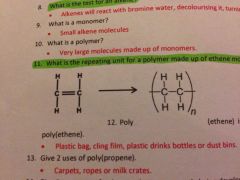![]()
![]()
![]()
Use LEFT and RIGHT arrow keys to navigate between flashcards;
Use UP and DOWN arrow keys to flip the card;
H to show hint;
A reads text to speech;
23 Cards in this Set
- Front
- Back
- 3rd side (hint)
|
What is cracking?
|
Breaking down large hydrocarbon molecules into smaller hydrocarbons.
|
Big to small.
|
|
|
Why is cracking important?
|
Large hydrocarbon molecules are not useful as fuels as they have high boiling points, do not burn easily and are difficult to vaporise. Cracking long chained molecules into short chained molecules makes them more useful.
|
3 key points.
|
|
|
What type of reaction does cracking involve?
|
Thermal decomposition reaction because the long chained hydrocarbons are being broken down into short chained hydrocarbons in a high temperature.
|
What happens when the larger molecules break down into smaller molecules.
|
|
|
What are the products of cracking?
|
Alkanes and alkenes.
|
Two products.
|
|
|
How is cracking carried out?
|
An Alkane is heated, vaporised and passed over a hot catalyst of silica/alumina/porous pottery or mixed with steam.
|
What is it heated over?
|
|
|
What are alkenes?
|
Alkenes are unsaturated hydrocarbons that contain a carbon to carbon double bond.
|
(C=C)
|
|
|
What is the general formula for alkenes?
|
CnH2n
|
C?H??
|
|
|
What is the test for an alkene?
|
Alkenes will react with bromine water, de-colourising it, turning it from orange to colourless.
|
What kind of water reacts with alkenes?
|
|
|
What is a monomer?
|
Small alkene molecules.
|
What size and type of molecules?
|
|
|
What is a polymer?
|
Very large molecules made up of monomers.
|
What size molecules; what are they made of?
|
|
|
What is the repeating unit for polymer made up of ethene monomers (poly(ethene))?
|

|
Add brackets!
|
|
|
Poly(ethene) is a useful plastic. Give 3 uses of poly(ethene).
|
Plastic bags, cling film, plastic drinks bottles or dust bins.
|
Plastic items.
|
|
|
Give 2 uses of poly(propene)
|
Carpets, ropes, or milk crates.
|
Fabric based items.
|
|
|
Give 3 new uses of polymers that are currently being developed?
|
Light sensitive plasters(stickiness can be switched off before the plaster is removed), Hydrogels(contain cross links to trap water. Used for wound dressings and contact lenses), Shape Memory Polymers(used for stitches that will keep the sides of cuts together. Change in temperature causes the polymers to change shape. When a wound is healed the polymer is designed so the stitches will dissolve.), New Polymer Material for Dental Fillings(Mercury is toxic and dentists who work with it every day are at risk therefore new polymer material is being developed.)
|
Give reasoning!
|
|
|
What is the problem with disposing plastic in landfill sites?
|
Plastics are non-biodegradable which means they do not decompose.
|
What type of plastic are they made up of? What does this mean it doesn't do?
|
|
|
What problems can non-biodegradable plastics lead to?
|
Wildlife can get trapped in the waste or eat the plastic and could die, Plastics take up valuable space in landfill sites as they take years and years to break down completely, Increased litter in the streets.
|
Effects of leaving plastic around? Wildlife, etc?
|
|
|
What is a biodegradable plastic?
|
A biodegradable plastic is one that is made from plant materials and can be broken down by microorganisms.
|
What is it made up of?
|
|
|
What are the 2 ways that ethanol can be produced?
|
Fermentation and hydration.
C2H4 + H2O --> C2H5OH |
Equation?
|
|
|
How is ethanol made by fermentation?
|
To make alcoholic drinks, sugar from plants in fermented. Enzymes in yeast breakdown the sugar into ethanol and carbon dioxide.
C6H12O6 -> 2C2H5OH + CO2 |
The process? Machines or natural processes?
|
|
|
How is ethanol make by hydration?
|
Ethanol for industrial use is made from ethene gas. Ethene is made when crude oil is cracked. Ethene reacts with steam in the presence of a catalyst to make ethanol.
|
What does ethene react with to make ethanol?
|
|
|
What is a catalyst?
|
A catalyst is a substance that increases the rate of a reaction without being used up in the reaction.
|
What does it do?
|
|
|
What are the advantages and disadvantages of making ethanol by fermentation?
|
Advantages; sugar and plants are a renewable source. Carbon neutral (it only releases the same amount of carbon it absorbed)
Disadvantages; fermentation is a batch process which takes a lot longer. Ethanol produced is not pure and has to be refined. Land used to grow crop can't be used to grow food. |
What are the good and bad about this?
|
|
|
What are the advantages and disadvantages of making ethanol by hydration?
|
Advantages; hydration is a continuous process so produces ethanol much faster. Ethanol produced is pure.
Disadvantages; hydration relies on using ethene from crude oil which is a non-renewable resource. High temperatures require lots of energy so high costs and emission of CO2 (greenhouse gas, global warming) |
|

